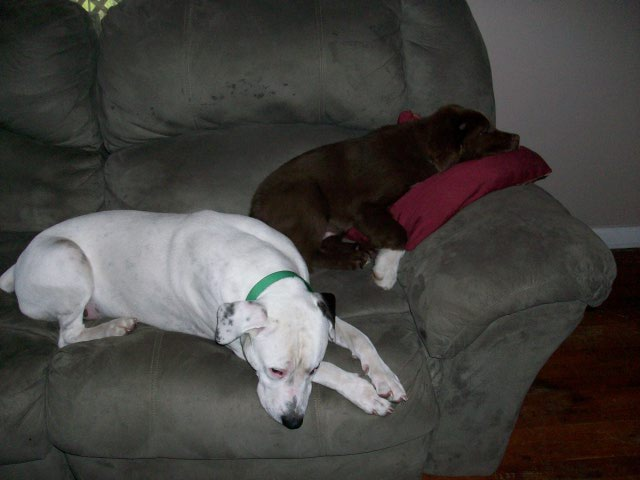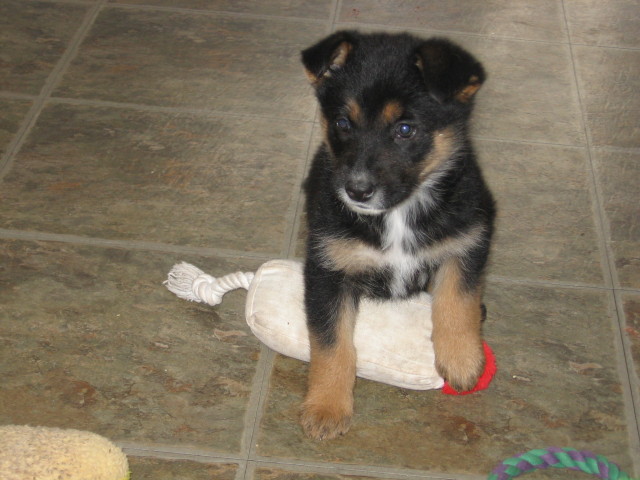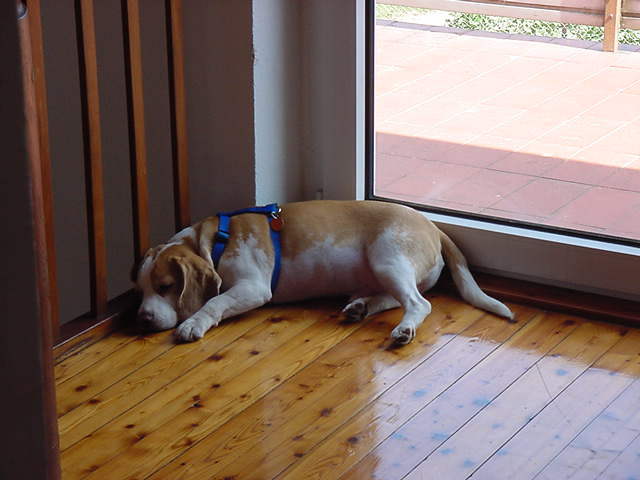QuestionQUESTION: I have a 4 year-old male, neutered golden. He has a great loving personality. He is friendly with people/children/other animals. However, he is afraid of his own shadow...loud or strange noises...or shouting (in anger). He panics...runs...cowers down. As a pup he was raised by a breeder who appeared to be loving...he was a happy pup when we picked him out of the litter. When he first came home with us (13 wks) he slept against the wall in a corner or behind something...or he would crawl above our heads to sleep. He did not like cuddling...and would do a low soft growl, but with some work he overcame that. He has never been abused or beaten, but acts like he has. We have another golden (not blood related) who is outgoing...playful..agile...willing to try and do anything...go any where and never flinches at anything. Any advice to help Manny? We take him places with us...on walks, etc....he still is a scaredy cat...
Thanks!
ANSWER: Your dog appears to have an inherited fear problem; he has what is called a very "soft" temperament. Such dogs require a great deal of positive reinforcement, NEVER ANY COERCION, punishment, shouting, etc. You've handled his developing fear aggression quite well and are to be commended; the Golden developed (in the late 80s) a serious fear and dominance aggression problem, quite aberrant in this breed. IGNORE his fear response, no matter to what (including thunderstorms!) REWARD his confidence, no matter where or how displayed; food treats, pats, lavish praise, will help Manny; but he will never be the confident dog your other Golden is. I had a Whippet with a CGC and a CDX who was the single most heavily socialized dog on the planet; she also suffered from an inherited fear problem. Although she was far more fearful than any other dog I've ever lived with, ignoring her fear response and rewarding any confidence she demonstrated (along with heavy socialization and positive reinforcement training) helped her to live a long, happy life (sixteen, quite old for a Whippet.) Love him for who he is and help him to develop better cognition and more confidence by demonstrating fair, consistent leadership.
---------- FOLLOW-UP ----------
QUESTION: I do have one more question on Manny...he is 4 years old and still has to be crated during the day. He still chews. If he is left in the house without being crated (with or without the other golden) he will chew shoes, toys, etc. He sleeps in my oldest daughter's room at night and if there is ANYTHING left on her floor...he will chew it. He chews anything that is left behind on the floor from the baby, but only when things quiet down for the night. He doesn't usually go and get things to chew on when we are together as a family. He has chewed every type of bedding that I have put in his crate. As much as I hate to have him laying on the metal floor...he won't leave anything in there for comfort and I worry about the cold metal and his joints. I'm not opposed to leaving him crated, but I would like to provide him with some kind of cushion. Also, I'm wondering if he chews b/c of separation anxiety...it seems that as long as he has full access to the family his chewing episodes are few and far between. Sometimes he gets things in his mouth and sits and stares at us for attention...could it be an attention getter? He knows it's wrong b/c when you catch him...he gets that guilty look and lowers his head...THANKS AGAIN!
AnswerThere is no "right" and "wrong" to a dog. When a dog appears to be showing contrition or guilt, what s/he is actually doing is demonstrating a combination of submission and fear.
Yes you may have inadvertently trained your dog to obtain (and then chew) objects he should not have because of your reaction to him (join a VERY LARGE CLUB lol.) I've seen many dogs with defense aggression problems because owners have chased them in an effort to get back the TV remote control, etc.! And yes, he appears to have some separation issues (sleep is separation as attention is removed.) Your dog really has some issues involving inherited temperament but none of these are dangerous (thankfully!) and he's obviously well loved and cared for. Whenever the dog obtains any object he is not intended to have and anyone in the family notices this, that person (or all of you) should GET UP and LEAVE THE ROOM. You can actually set the dog up for this: throw a sock or unwanted toy on the floor; wait for the dog to go to it and pick it up; then LEAVE THE ROOM immediately. Put a closed door (if possible) between you and the dog, count to ten, go back in. If the dog still has the object, leave the room again; wait until the dog has abandoned the object (and he will, usually takes three trials) and then, if he picks it up again, leave the room. I've cured dozens of dogs of "stealing" habits with this regimen; it can be time consuming at first, but it always works in the end. Obviously, you all have to pick up anything in the dog's path you don't want him to have when you are not able to pay attention (as your daughter must at bedtime, a really good way to teach her to keep her room clean!) You can also create a trophy object by obtaining several dog toys that look alike (identical); have every member of the family carry one around for a few days in plain sight of the dog. When the dog is most tempted to obtain an object he shouldn't have, leave one of these trophies in his sight and let him have that. He should form a strong attachment to these objects, most dogs do. It's a small trick that sometimes works in extinguishing anxiety driven object destruction (socks, underwear, etc.)
Regarding the crate, many dogs have this tendency to destroy bedding. This is a part of barrier frustration and anxiety. I guess you are crating Manny because of his destructive tendencies? If he's fully house trained and confined to an area where there isn't anything for him to destroy (unless of course he chews walls and woodwork) -- like the kitchen -- there's no need for the crate. If, however, he has proven himself a house wrecking crew and absolutely needs the crate, you can at least keep it warmer by placing it on a fleece lined blanket. Addressing the separation anxiety is absolutely necessary if crating "during the day" means more than a few hours at a time.

 American Bulldog aggression
Question
Buddy and Rez
I have a 2 year old Ameri
American Bulldog aggression
Question
Buddy and Rez
I have a 2 year old Ameri
 puppy problems
QuestionQUESTION: I am the proud owner of 2 german shep
puppy problems
QuestionQUESTION: I am the proud owner of 2 german shep
 Companion for Lonley Westie
Question
Shannon
We have a 5-year-old neutered Westie w
Companion for Lonley Westie
Question
Shannon
We have a 5-year-old neutered Westie w
 Nightmares?
Question
Beethoven
Hi Melissa, Ive had my very h
Nightmares?
Question
Beethoven
Hi Melissa, Ive had my very h
 licking the floor not stop
QuestionGeorgie
QUESTION: Hi,
I have a 7 year ol
licking the floor not stop
QuestionGeorgie
QUESTION: Hi,
I have a 7 year ol